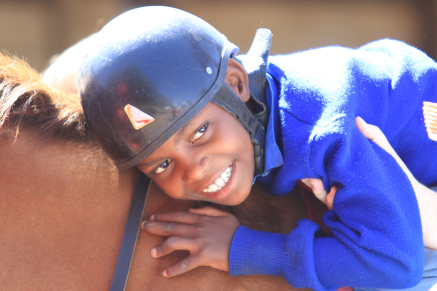
Trauma surviving, physically impaired and disadvantaged children in Zimbabwe are accessing free therapeutic horse training as a rehabilitation endeavour that fights the associated stigma and boost confidence .
By Wellington Zimbowa
Thanks to Jill Burgers and Aileen Johnstone, both certified professional therapeutic horse riders who started the Bulawayo-headquartered Healing with Horses (HwH) initiative in 2000.
“We were led to start HwH due to the number of disabilities we saw in the community and the response, superstition and stigma attached to these disabilities,” said Burgers.
Heal with Horses aims at healing children and communites through equine-assisted therapy (EAT). This kind of therapy involves activities with horses and other equines to promote human physical and mental health.
Bulawayo mother and social worker Janette Fenicia expressed gratitude over the programme, saying her two children recovered their confidence and concentration levels after starting classes with the centre.
“I would like to thank the centre [HwH] for steering the recovery of my 15-year-old child suffering from a cognitive condition called attention deficit disorder and dyslexia,” she said.
Patients of attention deficit disorder and dyslexia, which in most cases are children generally, suffer from inattention, distractibility, hyperactivity and impulsivity as well as language-based learning disability.
- Chamisa under fire over US$120K donation
- Mavhunga puts DeMbare into Chibuku quarterfinals
- Pension funds bet on Cabora Bassa oilfields
- Councils defy govt fire tender directive
Keep Reading
Sandra Jones Centre, a shelter supporting children, including sexual abuse survivors, acknowledged the relief its children get from HwH.
“It is hard to believe that horse riding can change a person’s life, but we have seen this first hand in the children that have been part of the HwH programme,” said the centre’s founder Sandra Jones.
According to Jones, the traumatised and broken children tend to lose trust in adults, are anti-social and have low confidence.
She said children who go through EAT become confident, outgoing and are more disciplined.
“Sandra Jones Centre is 100% behind the HwH programme. It is truly an outstanding programme, which changes children’s lives,” said Jones.
“On top of it all, the therapy is done in a friendly environment with a lot of fun and wonderful outings for our children each week.”
Burgers, a veterinary nurse and trauma therapist by profession, said one of the beneficiaries of the horse therapy was King George VI (KGVI) Centre.
She said over 10 children from the centre suffering from cerebral palsy had recovered.
“We work with 75 children from KGVI, 35 from Sandra Jones Centre, 15 from Harvest Family Village, 12 from Ingutsheni Psychiatric Hospital, 12 from St Francis Hospital and another 20 or so individuals with disabilities,” she said.
“Every single one of these people has a success story with us.”
Jill said the programme that survives from well-wishers would cast its net wider to accommodate people from the northern parts of the country.
“We have expanded from Bulawayo to Harare, where Trish Lillie represents us. It is one of our goals this year to educate more people in order to help communities in Zimbabwe,” she said.
HwH adheres to strict international therapeutic horse riding professional standrads that include vigorous training, covering safety and in-depth horse riding knowledge, child and disability sensitivity.
Burgers, however, said there were cultural barriers to the use of animals in therapy.
“Most people in Zimbabwe do not understand the importance of animals as pets at the best of times,” she said.
“They see no reason in feeding an animal and caring for it with the responsibility needed in a society where it is difficult to feed, clothe, and educate your own family.”











